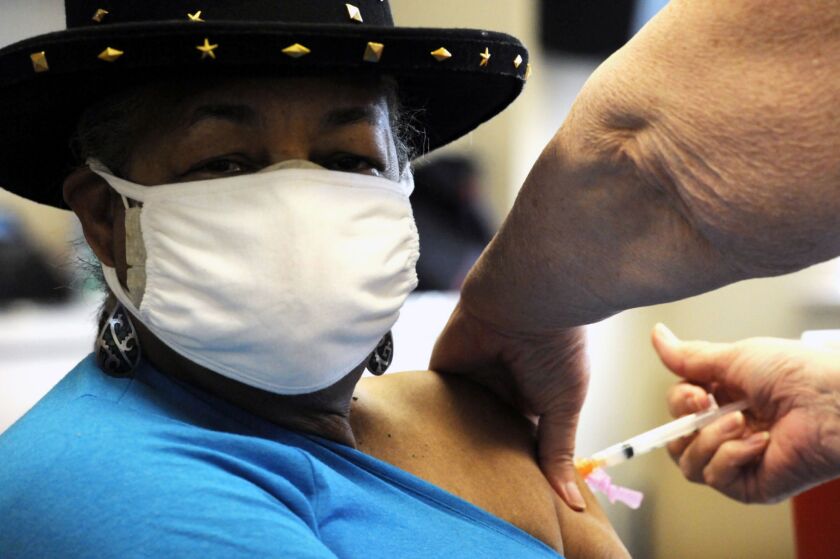TUSKEGEE, Alabama — Lucenia Dunn spent the early days of the coronavirus pandemic encouraging people to wear masks and keep a safe distance from each other in Tuskegee, a mostly Black city where the government once used unsuspecting African American men as guinea pigs in a study of a sexually transmitted disease.
Now, the onetime mayor of the town immortalized as the home of the infamous “Tuskegee syphilis study” is wary of getting inoculated against COVID-19. She’s suspicious of the government promoting a vaccine developed in record time when it can’t seem to conduct adequate virus testing or consistently provide quality rural health care.
“I’m not doing this vaccine right now,” said Dunn, who is Black. “That doesn’t mean I’m never going to do it. But I know enough to withhold getting it until we see all that is involved.”
The immunization campaign is off to a shaky start in Tuskegee and elsewhere in Macon County. Health officials and government leaders point to a resistance spawned by distrust of government promises and decades of failed health programs. Many in this city of 8,500 have relatives who were subjected to unethical government experimentation during the syphilis study.
“It does have an impact on decisions,” said Frank Lee, Macon County’s emergency management director, who is Black.
Health experts say that, while the vaccines were developed with record speed, they were based on decades of research and are safe and effective. Vaccines used in the United States have shown no signs of serious side effects in studies of tens of thousands of people, and no red flags have been reported with more than 26 million vaccinations administered nationwide.
Still, skepticism seems to run deep in Tuskegee. When Alabama and the rest of the South were still segregated by race, government medical workers, starting in 1932, withheld treatment for unsuspecting men infected with syphilis in Tuskegee and surrounding Macon County so doctors could track the disease. The study, which involved about 600 men, ended in 1972, only after it was revealed by The Associated Press.
A lawsuit filed on behalf of the men by Black Tuskegee attorney Fred Gray resulted in a $9 million settlement, and then-President Bill Clinton apologized on behalf of the U.S. government in 1997. But the damage left a legacy of distrust that extends far beyond Tuskegee: A December survey showed 40% of Black people nationwide said they wouldn’t get the coronavirus vaccine. Such hesitancy is more entrenched than among white people, even though Black Americans have been hit disproportionately hard by the virus.
The Nation of Islam, the Black nationalist group based in Chicago, is warning away members nationwide with an online presentation titled “Beyond Tuskegee: Why Black People Must Not Take The Experimental COVID-19 Vaccine.”
Gray, 90 and still practicing law in Tuskegee, rejects such comparisons. The syphilis study and the COVID-19 vaccine are completely different, he said. He believes that enough that he has gotten the vaccine and is encouraging others to do so.
Georgette Moon is on a similar mission. Hoping to protect herself and encourage skittish friends, the former city council member recently bared an arm and let a public health nurse immunize her. Now, Moon said she hopes more fellow Black residents could overcome their lingering fears and get the vaccine.
“The study is a huge factor,” Moon said. “I’ve had very qualified, well-educated people tell me they are not going to take it right now.”
The Macon County health department could perform as many as 160 immunizations a day. But a maximum of 140 people got the vaccine on any single day during the first six days of appointments, with a total of 527 people immunized. Health workers, emergency responders and long-term care residents are currently eligible for shots in Alabama, along with people 75 and older.
State statistics show a slow uptick in the number of people coming in for vaccinations, and word seems to be getting around that it’s OK to be vaccinated.
Down the street from the county clinic, the Veterans Affairs hospital in Tuskegee is vaccinating veterans over 65. While only 40% of the VA workers in the area have been vaccinated, more people are agreeing to the shots than during the initial wave, said Dr. April Truett, an infectious disease physician at the hospital.
The Rev. John Curry Jr. and his wife got vaccinated after the health department said they could get appointments without a long wait. The pastor of the city’s oldest Black church , Curry said he’is encouraging congregants to get the vaccine.
Yet he understands the lingering distrust in a town forever be linked to one of the most reviled episodes of U.S. public health history.
“It’s a blemish on Tuskegee,” he said. “It hangs on the minds of people.”






